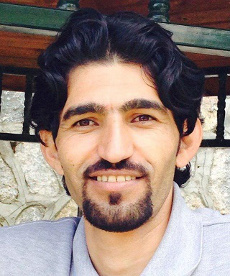With grave doubts in his case, Mohammad Salas was put to death. Now his lawyer has been arrested.
 Mohammad Salas was executed the morning of June 18 despite the fact that serious questions surround his whereabouts at the time of a mid-February bus collision for which he was sentenced and lawyers and other observers have identified serious due process failures in his case [1]. Less than 48 hours after he was put to death, his lawyer, Zeynab Taheri, has been arrested after promising to release information demonstrating her client’s innocence [2].
Mohammad Salas was executed the morning of June 18 despite the fact that serious questions surround his whereabouts at the time of a mid-February bus collision for which he was sentenced and lawyers and other observers have identified serious due process failures in his case [1]. Less than 48 hours after he was put to death, his lawyer, Zeynab Taheri, has been arrested after promising to release information demonstrating her client’s innocence [2].
To add insult to injury, officials have denied Salas’ family information, access, and rights to grieve and bury their loved one. Salas’ son Ali stated in a June 18 video that authorities had given assurance that Salas’ execution would be carried out June 20, but executed him within hours nonetheless. He also reported a very strong, heavily armed security presence and road closures near Raja’i Shahr Prison where the execution took place. Officials denied Salas’ family permission to conduct a burial themselves, taking Salas’s body from Raja’i Shahr to Borujerd – a distance of more than 175 miles – and interring him in the presence of a large number of security force agents. Authorities also prevented Salas’ body from being sent to a forensic medical expert to investigate evidence of torture [3].
Taheri’s arrests follows that of Nasrin Sotudeh, who was taken into custody on June 13. Both women were representing clients involved in protest activity – in Sotudeh’s case, the “Girls of Enqelab Street” who publicly removed their compulsory hejabs this year. Their arrests fit a pattern of Iran’s judiciary harassing and persecuting lawyers who insist on defending their clients’ fundamental rights.
Taheri, news of whose arrest broke around 12:00 PM EST on June 2018, had promised to make evidence available to media outlets which proved Salas’ evidence. Taheri reported that a witness was prepared to testify that Salas was already in custody at the time of the collision – a claim corroborated by a voice recording of Salas himself which circulated on social media.
In May of this year, Taheri petitioned Iran’s Supreme Court for a retrial, claiming that Salas had been severely tortured into giving a coerced confession and that she had not been given adequate time and resources to prepare a defense for his Supreme Court appeal.
Salas, a member of Iran’s persecuted Gonabadi darvish religious community, was given a death sentence in a hasty and unfair trial for a mid-February 2018 bus collision which took place during a chaotic crackdown on protesting darvishes who had gathered to prevent the arrest of their spirital leader, Nur Ali Tabandeh. The collision resulted in the deaths of three anti-riot police. Video of the incident used as evidence does not show an identifiable driver, and some observers have questioned whether the vehicle it depicts belongs to Salas.
For more on the grave failures of due process and fair trial which marked Salas’ case, see ABC’s newsletter, “For Mohammad Salas, a Retrial is the Least Iran’s Judiciary Can Do.”
[1] Human Rights Activists News Agency (HRANA)
[2] Telegram channel of BBC Farsi, June 19, 2018





 My Interrogator Said: You Are An Ass, And Asses Do Not Merit Human Rights
My Interrogator Said: You Are An Ass, And Asses Do Not Merit Human Rights